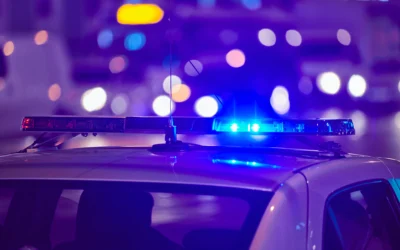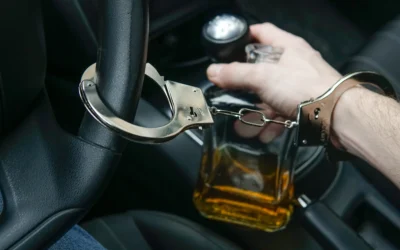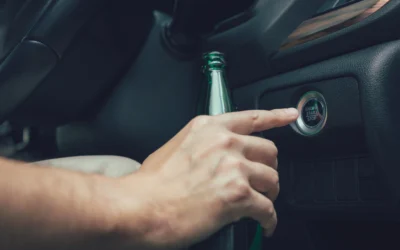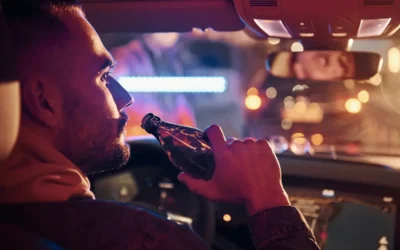When facing a DUI stop in Nevada, one of the most significant decisions you’ll make involves whether to submit to a breathalyzer test. This choice can have immediate and long-lasting consequences that extend far beyond the traffic stop itself. Many drivers find themselves unprepared for this moment, unsure of their rights and the potential outcomes of their decision.
The question of breathalyzer refusal brings up numerous concerns. What are your legal rights? What penalties might you face? How will this decision affect your criminal case and your driving privileges? Understanding Nevada’s laws around breathalyzer refusal is essential for anyone who drives in our state, as the consequences can impact your life for years to come.
What Does Nevada Law Say About Breathalyzer Refusal?
Nevada operates under what’s called “implied consent” laws, meaning that by driving on our state’s roads, you’ve automatically agreed to submit to chemical testing if lawfully arrested for DUI. This principle is codified in Nevada Revised Statutes Section 484C.160, which forms the backbone of Nevada’s approach to DUI enforcement.
However, the law includes nuances that many people don’t fully grasp. While you can refuse a breath or blood test after arrest in Nevada, doing so triggers serious legal consequences under the state’s implied consent laws.
The Two Types of Breathalyzer Tests in Nevada
Before discussing refusal consequences, it’s important to distinguish between the two different types of breath tests you might encounter during a DUI investigation:
Preliminary Breath Test (PBT) This is the roadside test that officers often request during a traffic stop, before making an arrest. In Nevada, you can refuse a PBT without immediate penalties. This test is primarily used to help officers determine whether they have probable cause to arrest you for DUI.
Evidentiary Breath Test This is the official test conducted after your arrest, typically at the police station or jail. This test produces evidence that can be used in court to prove your blood alcohol content (BAC) was at or above Nevada’s legal limit of 0.08%. This is where Nevada’s implied consent laws really come into play, as governed by NRS 484C.160.
What Happens When You Refuse the Evidentiary Breath Test?
When you refuse to take an evidentiary breath test in Nevada, you trigger a series of consequences that begin immediately and can continue for years. These penalties are outlined in NRS 484C.210.
Immediate License Suspension
DUI arrestees who refuse to submit to a breath or blood test face a one-year license revocation. This penalty takes effect immediately, not after your court case concludes. The police will provide you with a temporary license valid for seven days, after which your driving privileges are suspended.
The penalties become more severe for repeat offenders. If you have a prior revocation within the last seven years for refusing a chemical test, the revocation period extends to three years. This escalation means that multiple refusals carry increasingly harsh penalties.
Separate from Criminal Penalties
An important point that many people overlook is that a revocation for refusing a chemical test is separate from any penalty imposed for a DUI conviction. This means you could face license suspension for the refusal AND additional penalties if you’re ultimately convicted of DUI charges.
The Seven-Day Window
To contest the license suspension at a DMV hearing, you must request the hearing within those seven days as required by NRS 484C.230. This deadline is strict, and missing it means you forfeit your right to challenge the administrative suspension. Many people don’t realize how quickly they need to act, and by the time they contact an attorney, this window may have already closed.
Does Refusing Help Your DUI Case?
This is a complex question that depends on various factors specific to your situation. The answer requires balancing potential benefits against significant drawbacks.
Potential Benefits of Refusing
Without a breath test result, prosecutors don’t have the most direct evidence of your blood alcohol content. This can sometimes make their case more challenging to prove, as they’ll need to rely on other evidence like:
- Officer observations of your behavior
- Field sobriety test results
- Video footage from the arrest
- Physical evidence like the smell of alcohol
The Downside of Refusing
However, refusing comes with significant drawbacks beyond the license suspension:
- Prosecutors can use your refusal against you – Under NRS 484C.240, they can argue to a jury that you refused because you knew you were intoxicated
- You still face DUI charges – Refusing doesn’t prevent you from being charged with DUI
- Alternative evidence – Officers can still obtain a warrant for a blood test in many cases
- Enhanced penalties – Some circumstances may lead to enhanced penalties for refusal
Field Sobriety Tests vs. Breathalyzer Tests
While we’re discussing breath tests, it’s worth noting that field sobriety tests are different from breathalyzer tests. In Nevada, you can refuse field sobriety tests without the same automatic license suspension that comes with refusing a chemical test. Preliminary breath tests are governed by NRS 484C.150, while evidentiary tests fall under the stricter implied consent requirements. However, officers can still arrest you based on other observations and evidence.
When Blood Tests Come into Play
Nevada law allows you to refuse a blood test if means are reasonably available to perform a breath test. However, there are situations where officers may seek a warrant for a blood test, particularly if you’ve refused the breath test or if there are aggravating circumstances like an accident with injuries.
If you don’t consent to a test, officers may obtain a warrant before conducting a blood test. This adds complexity to refusal cases and means that refusing one type of test doesn’t necessarily prevent all chemical testing.
The Reality of Nevada’s Approach
Nevada takes a firm stance on DUI enforcement, and the state has structured its laws to discourage refusal. Refusing a chemical test results in immediate license suspension under Nevada’s implied consent laws, and these administrative penalties are designed to be swift and certain.
The state’s approach reflects a policy decision prioritizing road safety by quickly identifying and removing impaired drivers from behind the wheel. Regardless of your opinion on this approach, it represents the legal reality you must work within.
Making the Decision in the Moment
If you find yourself in this situation, remember that you’re making a decision with long-term consequences while under stress and with limited information. Every situation is unique, and the right choice varies from person to person.
Consider these factors:
- Your actual level of impairment
- Whether you have prior DUI convictions
- How important driving privileges are to your livelihood
- The strength of other evidence against you
The Importance of Legal Representation
Whether you refuse a breathalyzer test or not, having experienced legal representation is essential. An attorney who knows Nevada DUI law thoroughly can:
- Challenge the legality of the traffic stop
- Question the administration of tests
- File for DMV hearings within the seven-day window
- Negotiate with prosecutors
- Protect your rights throughout the process
Many people attempt to handle these cases on their own, thinking they can save money or that the case is straightforward. This approach can be risky, as DUI laws involve complex procedures and strict timelines that only experienced attorneys fully understand.
Alternative Outcomes and Plea Negotiations
Even if you refuse a breathalyzer test, skilled legal representation can sometimes lead to favorable outcomes. Prosecutors may be willing to negotiate reduced charges, particularly if there are weaknesses in their case or if this is your first offense.
Possible outcomes might include:
- Reduced charges to reckless driving
- Diversion programs
- Minimized penalties
- Dismissal of charges in appropriate cases
The Human Cost
Beyond the legal technicalities, it’s important to remember that DUI cases affect real people with real lives. A DUI conviction can impact your employment, your family, your finances, and your future opportunities. The decision to refuse a breathalyzer test is one part of a larger situation that requires careful consideration and skilled legal guidance.
Key Takeaways
- You can refuse a breathalyzer test in Nevada, but it comes with serious consequences under state law
- Refusing triggers automatic license suspension: one year for first refusal, three years for repeat refusals within seven years per NRS 484C.210
- You have only seven days to request a DMV hearing to contest the license suspension under NRS 484C.230
- Refusal doesn’t prevent DUI charges and can be used as evidence against you per NRS 484C.240
- Preliminary breath tests (roadside) can be refused without automatic license suspension
- Evidentiary breath tests (after arrest) are subject to implied consent laws under NRS 484C.160
- Nevada’s legal BAC limit is 0.08% for most drivers
- Blood tests may still be obtained through warrant even if you refuse breath tests
- Each situation is unique and requires individual analysis
- Legal representation is crucial regardless of whether you refuse or submit to testing
Frequently Asked Questions
Can I refuse a breathalyzer if I haven’t been arrested yet? Yes, you can refuse a preliminary breath test (PBT) during a traffic stop without triggering automatic license suspension. However, officers can still arrest you based on other evidence and observations.
What if I’m unconscious or unable to take the test? Nevada law has provisions for situations where a person cannot physically submit to testing. In these cases, officers may proceed with obtaining a warrant for a blood test.
Can I request a blood test instead of a breath test? You may request a blood test, but if means are reasonably available to perform a breath test when the blood test is requested, you may be required to take the breath test instead.
Will refusing automatically result in a DUI conviction? No, refusing a breathalyzer test doesn’t automatically mean you’ll be convicted of DUI. However, it does trigger administrative penalties and can be used as evidence against you in criminal proceedings.
How long do I have to request a DMV hearing? You have exactly seven days from the date of your arrest to request a DMV hearing. Missing this deadline means you lose your right to contest the administrative license suspension.
Can I get a hardship license if I refuse the breathalyzer? The availability of hardship or restricted licenses varies depending on your circumstances and prior history. This is something an attorney can help you determine based on your specific situation.
What happens if I have commercial driving privileges? Commercial drivers face additional complications with breathalyzer refusal. The consequences can affect both your regular driver’s license and your commercial driving privileges.
Is it better to refuse or take the test? This depends entirely on your individual circumstances. Factors like your actual level of impairment, prior history, and the importance of your driving privileges all play a role in this decision.
Contact Joey Gilbert & Associates Today
If you’re facing a DUI charge in Nevada, whether you refused a breathalyzer test or not, you need experienced legal representation immediately. The stakes are high, and the deadlines are strict.
At Joey Gilbert & Associates, we handle the complexities of Nevada DUI law and have successfully defended clients in all types of situations. We know how to challenge evidence, protect your rights, and fight for the best possible outcome in your case.
Don’t let a DUI charge derail your life. The decisions you make now will impact your future for years to come. Contact us today for a free consultation to discuss your case and learn about your options. Time is of the essence, and we’re here to help you through this challenging time with the skilled, aggressive representation you deserve.



